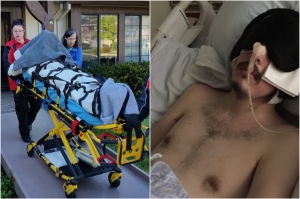Andy
Senior Member (Voting rights)
Moderator note:
We've merged a number of threads to collect Naomi's blog posts into one thread.
An article originally printed December 2016 but now updated with an audio version as well.
We've merged a number of threads to collect Naomi's blog posts into one thread.
An article originally printed December 2016 but now updated with an audio version as well.
https://www.opendemocracy.net/naomi...26-years-on-why-is-it-still-poorly-understoodI live in a world largely hidden from view. Most of my neighbours do not even know that I exist. I was last seen as a child walking home from school 26 years ago. In the decades since, I have rarely left my house; when I do, it is in a wheelchair.
Myalgic encephalomyelitis (ME) struck suddenly for me, with a viral infection, although for some the onset is more insidious.
Within a few months, it had stripped me of the ability to walk or talk, to move my arms or to open my eyes. It entombed me in such agonising pain that life was reduced to the drawing of each breath. My family and doctor expected me to die at any time. I survived, but for years it was a living death. I was too ill to tolerate any stimulation, and knew nothing but pain and complete darkness.
My personal experiences have moved me to campaign for greater awareness of an illness that affects an estimated 250,000 people in the UK, and millions worldwide. ME has been recognised as a neurological condition by the World Health Organisation since 1969. Symptoms include overwhelming fatigue made worse by exertion, pain, sensory sensitivity, sleep disturbance and cognitive dysfunction. The level of severity varies greatly between individuals, with most sufferers able to maintain a degree of presence in the outside world.
Last edited by a moderator:

